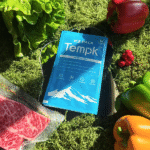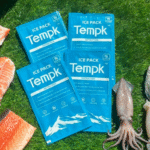La glace carbonique est essentielle pour conserver congelés les produits sensibles à la température, surtout pendant l'expédition. Lorsqu'il est emballé dans un sac isotherme, sa durée de vie peut varier. This article explores combien de temps dure la neige carbonique dans un sac isotherme and how you can maximize its efficiency during transport.
What Determines the Longevity of Dry Ice in an Insulated Bag?
-
Qualité de l'isolation: High-quality insulation materials significantly extend the cooling time of dry ice.
-
Température externe: Warmer environments accelerate the sublimation process.
-
Quantité de glace sèche: Larger quantities last longer due to slower sublimation.
-
Ventilation and Bag Size: Proper ventilation ensures CO₂ gas escape, preventing bag rupture.
How Long Can Dry Ice Last in an Insulated Bag?
En moyenne, La glace sèche peut durer n'importe où 18 à 72 heures in a well-insulated bag. The actual duration depends on several factors like the insulation type, température extérieure, and the quantity of dry ice used.
| Type de conteneur | Typical Hold-Time | Practical Use Case | Ce que cela signifie pour vous |
|---|---|---|---|
| Open environment (no bag) | 3-5 heures | Immediate sublimation | Only use for short-term needs. |
| Styrofoam cooler | 18-24 heures | Petites expéditions, excursion d'une journée | Basic but cost-effective option. |
| EPP insulated bag | 48-72 heures | Médicaments, long deliveries | Ideal for longer transport. |
| Vacuum-insulated container | 7+ jours | Biomedicine, marchandises | Best for extended transport. |
How Can You Maximize the Life of Dry Ice in an Insulated Bag?
To extend dry ice’s effectiveness, here are practical strategies:
-
Utilisez de plus gros blocs de glace carbonique: Larger blocks last longer as they sublimate more slowly.
-
Pre-Chill Your Bag: Avant l'emballage, chill the insulated bag to minimize temperature differences.
-
Limit Bag Openings: Every time the bag is opened, warm air accelerates sublimation.
-
Améliorer l'isolation: Use additional materials like towels or blankets to add more insulation.
-
Store in a Cool Location: Keep the shipment in a shaded, cool area to reduce external heat exposure.
Exemple pratique:
Une société pharmaceutique utilise large dry ice blocks, thick foam insulation, et tight packaging to ensure vaccines stay cold for over 48 hours during shipping.
How Does Dry Ice Compare to Gel Packs for Longevity?
Dry ice offers superior cooling capabilities, especially for items requiring sub-zero temperatures.
| Méthode de refroidissement | Plage de température | Durée de refroidissement | Sécurité | Impact environnemental |
|---|---|---|---|---|
| Glace sèche | –78,5 ° C | 18-72 heures | High risk of frostbite | Émissions élevées de CO₂ |
| Packs de gel | 0°C à –20°C | 4-12 heures | Sûr, réutilisable | Moderate environmental impact |
| Dry Ice Substitutes | –20°C to –40°C | Jusqu'à 48 heures | Faible risque, réutilisable | Écologique, biodégradable |
Conseil: When transporting frozen goods, glace carbonique remains the best option. Cependant, packs de gel are more suitable for items that only need to stay cool (au-dessus du point de congélation).
How to Safely Pack Dry Ice in an Insulated Bag
Follow these steps for safe and effective dry ice packing:
-
Calculer la quantité de glace carbonique: Utiliser environ 0.25 lb of dry ice per liter of bag volume for a 48-hour hold time.
-
Precondition the Bag: Chill the bag in a freezer for at least 60 minutes.
-
Position the Dry Ice: Wrap the dry ice in a breathable material like paper and place it on top of the items.
-
Aérer le sac: Always leave a small vent hole or open the zipper slightly to allow gas to escape.
-
Sceau et étiquette: Properly seal and label the bag with the correct Et 1845 marques.
Note: La glace carbonique est classée comme matières dangereuses. Always handle with care using gants isolés Pour éviter les gelures.
Latest Trends in Dry Ice and Insulated Packaging for 2025
The cold chain logistics sector is evolving with innovations that optimize dry ice storage and sustainability.
Tendances clés:
-
Biodegradable Insulation Materials: Growing use of eco-friendly materials like aérogel et Co₂ recyclé pour l'emballage.
-
Bouchons de ventilation intelligents & Capteurs: These allow real-time monitoring of Niveaux de CO₂ et température, optimizing dry ice usage.
-
Focus sur la durabilité: Demand for reusable dry ice substitute packs continue d'augmenter, offering lower CO₂ emissions.
Insistance au marché:
-
Le global marché de la logistique de la chaîne du froid devrait croître de 7.6% TCAC depuis 2025 à 2032, driven by pharmaceutical and e-commerce sectors.
-
Environmental Regulations: Increased regulations are pushing for plus vert solutions like pellets de CO₂ recyclés et PFAS-free foams.
FAQ
Q1: How long does dry ice last in a cooler bag?
La glace sèche dure généralement 18-24 heures in a well-insulated cooler bag, depending on the insulation quality and external temperature.
Q2: Can dry ice be used in a plastic bag?
Non, plastic bags do not provide adequate insulation and can result in quick sublimation of dry ice. Use an insulated bag for better results.
Q3: Is dry ice safe for indoor use?
Utilisez toujours de la neige carbonique dans des zones bien ventilées. Never use it in sealed spaces, as it can lead to CO₂ buildup, which is hazardous.
Conclusion et recommandations
Dry ice is essential for preserving temperature-sensitive products, especially those requiring freezing temperatures. By choosing high-quality insulation, optimizing packing methods, and keeping up with the latest trends in sustainable cold chain logistics, you can ensure effective transportation of goods. Pour les expéditions longue distance, use large dry ice blocks and vacuum-insulated bags. For short-term cooling, considérer packs de gel ou dry ice substitute packs.
À propos du tempk
Le tempk est un leader de la logistique de la chaîne du froid, providing innovative dry ice packaging solutions to ensure your goods remain at the optimal temperature during transport. With eco-friendly options and cutting-edge materials, Tempk helps you stay ahead of the latest trends in the industry.
For personalized advice, Contactez-nous aujourd'hui!
























